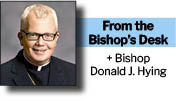
One of my favorite contemporary authors is Michael O’Brien, a Canadian and a Catholic, who has written numerous intriguing novels with compelling spiritual themes.
His most popular book is Father Elijah: An Apocalypse, the story of a priest who is caught up in the cosmic struggle between good and evil, between Christ and the Anti-Christ.
His books are haunting to me because O’Brien saw decades ago where our culture was going and how the consequences of materialism, relativism, and a rejection of God would ravage the human person and our society.
In every O’Brien novel, the protagonist is fundamentally a good and moral person, yet profoundly wounded by life, who is caught up in dramatic events of disturbing evil and destruction.
Overlapping themes
In Sophia House, a Polish bookseller endures the cataclysm of World War II, as he hides a Jewish boy from the Nazis in his attic.
In Island of the World, a Croatian boy living an idyllic childhood, suffers the brutal murder of his entire family by Communists, and later endures soul-destroying torture, imprisonment, and the loss of his wife and baby, because he dared to belong to an underground group of intellectuals who sought to culturally resist the Tito regime in Yugoslavia.
Persistent, central themes emerge in all of Michael O’Brien’s works. He paints in vivid and disturbing colors the human, cultural, and societal damage which occurs when an individual, a people, or a country turn away from God and embrace false ideologies.
The enormous evil unleashed upon the world through both Nazism and Communism was the direct result of a fundamental misunderstanding of human identity.
Both malignant systems viewed the individual person as a soulless automaton, a cog in the wheel, a slave of the state, a sub-human.
Any sense of spiritual transcendence, human dignity, or moral freedom found no room in these totalitarian systems, and so millions of people were murdered.
O’Brien also explores the mystery of human freedom and suffering.
His central characters face the ultimate moral challenge of remaining true to their convictions about God, truth, and love and thus suffering horrifically for it or betraying their beliefs in order to avoid the necessary and painful cost of integrity.
His protagonists are not naïve, cardboard cut-out heroes who easily do the right thing. They lose faith in God, they stop praying, they sweat and struggle, they fall and get up, but in the end, each one chooses life, faith, mercy, and forgiveness. They come to the Lord in the end on their knees, even though those knees are broken, bruised, and bloody.
In Eclipse of the Sun and Plague Journal, O’Brien brings the fundamental struggle between God and Satan to our contemporary experience.
These novels underline the point that the current dictatorship of relativism, the ravages of the sexual revolution, and the rejection of traditional religious faith and Christian anthropology are, in many ways, as dangerous and destructive as the murderous regimes of the past.
Important lessons taught
Whereas the Nazis and the Communists were blatantly evil in a global and absolute way, creating gulags, death camps, and gas chambers along their bloody path, today’s ideologies mask their human destruction through seemingly benign concepts such as choice, freedom, and tolerance.
Today, one may not be tortured or killed for affirming the evil of abortion, asserting that there are two sexes created by God, or holding up the integrity of marriage, but such convictions will encounter the loss of reputation, livelihood, career, friendships, and even in some cases, violence.
In Brideshead Revisited, a powerful Catholic novel by Evelyn Waugh, the remarkable individuals, similar to those in O’Brien’s books, all come home in the end to the Father’s house, profoundly wounded by their experiences, tested in the crucible of unimaginable suffering and loss, but ultimately filled with hard-won wisdom, peace, acceptance, and forgiveness. They movingly remind the reader that the transcendent realities of love, truth, mercy, and goodness are not simply beautiful ideas or concepts, but are reflections of the One who created, redeemed, and sanctifies us through the outpoured blood of the pierced One.
To affirm the dignity and transcendence of the human person, made in the image and likeness of God, has always been a prophetic act. Michael O’Brien illuminates in sublime and haunting colors the cost of such a heroic action, but even more significantly that such a sacrifice is radically worth it.

